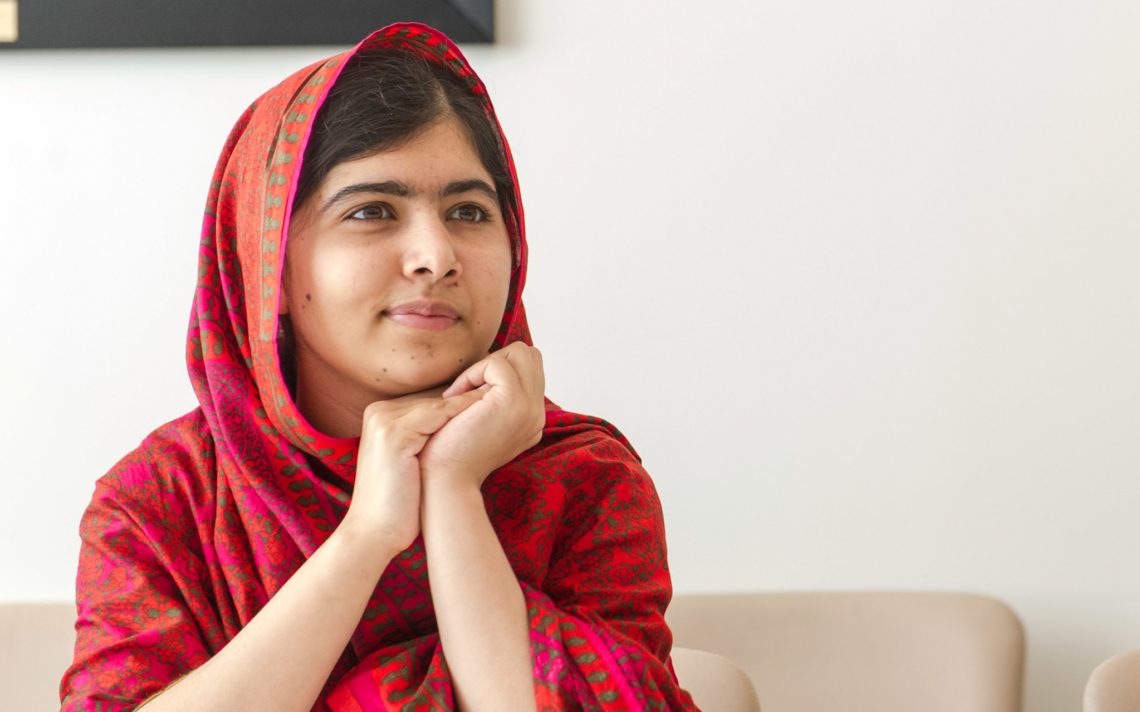MALALA. Her name represents strength, resilience, the potential of girls and – education. Malala’s experience as a child is a real David and Goliath tale, with a fifteen year old girl standing up against those who would rather end the lives of girls and women rather than see them educated and thriving. Malala Yousafzai is now nearing 30 and has used her frightening and traumatic ordeal to advocate for girls’ education worldwide. Malala has spoken at conferences, addressed world leaders, written bestselling books, runs the Malala Fund and won the Nobel Peace Prize at age 17 – making her the youngest Nobel winner in the award’s history.
But behind the laurels is a young woman who sees the potential in girls and women, and education as the means to realize this potential. For this reason, she continues to advocate for the academic empowerment of girls and women. Each year on July 12th, on the anniversary of her birth, the world celebrates Malala Day and uses it as an opportunity to shine the light on girls’ education in various parts of the world and collectively devise solutions to mitigate the problem of the lack of access to education for girls. Mission: Every Girl in School is an initiative that equips underprivileged families across India who are too poor to send their daughters to school.
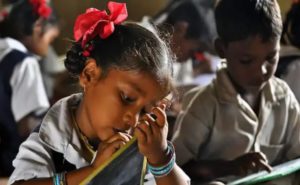
For various reasons including discrimination or poverty, girls are out of school. By covering the cost of their education, Mission: Every Girl in School places girls back in their classrooms – where they belong.
Malala: attacked but resilient
Inspired by strong female leaders as a child, Malala Yousafzai started her activism at age 11. Encouraged by her father, who is himself an education activist, Malala wrote down her personal experience as a girl living under oppressive rule. This “diary” was shared with BBC Urdu and it caught the attention of a New York Times journalist who made a documentary about her experiences. Hailed for setting a good example for others in Pakistan, Malala continued to focus on her education and was on her way home after writing an exam when she was shot in her head in an assassination attempt by the Taliban. Her journey of recovery and refusal to be silenced by regressive forces made headlines around the world – and the rest is history.
“Malala day is not my day. Today is the day of every woman, every boy and every girl who has raised their voice for their rights.” – Malala
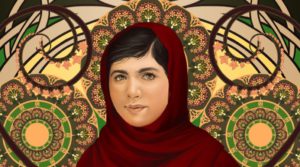
Why is girls’ education opposed and feared?
For multiple reasons, girls across India are denied the chance to go to school and receive an education. One of the main reasons is being unable to afford an education. Even in families where one or a few children can be educated, parents prefer to educate their sons rather than daughters, who are not regarded in the same manner and expected to be restricted to the house – doing household chores, raising children and taking care of their families at home for the rest of their lives. There is no attention that is given to the potential of these girls and how they might contribute to society and the world at large in various fields.
This discrimination against the girl child has persisted for centuries and still continues to the present day. It can be found in the gender stereotypes that affect girls, especially those from marginalized communities. Socio-cultural practices such as child marriage and the stigma against menstruation also place a heavy restriction on education for girls. But this failure to invest in girls’ education is disastrous for the individual, her family, her community and her entire nation at large.
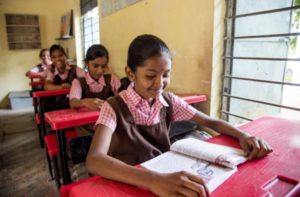
Why should girls be educated?
It has been proven that when girls are educated, there is a reduction in the rate of crimes such as child labor, child trafficking, child marriage, child abuse and other social evils that plague children and their families. But when girls are enrolled in school, they are safe in their classrooms. Once educated, girls will go on to pursue higher studies or employment, further reducing the chances of becoming victims of crimes.
While these crimes are going down, girls are also on their way to earning higher incomes which leads to economic growth and a strengthening of the country’s workforce. Just like Malala, these girls develop a greater social consciousness and are equipped with the academic foundation to participate in the sciences, arts, health, medicine, aviation and every other possible field of study. Educated girls are also more likely to educate their own daughters, thus ending the cycle of poverty and discrimination against half the population.
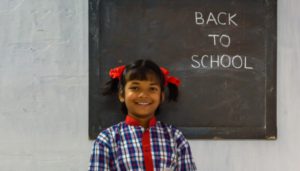
Mission: Every Girl in School
Give.do’s Mission: Every Girl in School has examined the issues that prevent families from sending their daughters to school and at the root of this is poverty. Because families cannot afford school fees or the cost of school related materials, they pull their daughters out of school and keep them at home where they are forced to do household chores and have nothing to look forward to in life. But no child should be forced to give up on her education because of a lack of money. Mission: Every Girl in School covers the cost of school tuition fees, school uniforms, books, stationery and other school related expenses.
Because students require financial assistance until they graduate, Mission: Every Girl in School encourages you, the donor, to pledge your support of ₹1,000 each month to ensure that a girl child has the support she needs to study for that month. This Malala Day, let’s continue to spread the mission of girls’ education and empowerment. To support Mission: Every Girl in School, you can donate here:
Support Mission: Every Girl in School
–
Give’s mission is to “make giving bigger and better.” Give is the most trusted donation platform in India for fundraisers and crowdfunding campaigns. Through our technology solutions, we enable individuals and organisations to fundraise and donate to a cause, charity or NGO with trust and convenience. Give’s community of 2.7M+ individual donors and 300+ organisations supports 3,000+ verified nonprofits with 80G deduction and serves 15M+ people across India. Find a fundraiser today!

Shirley has been in the development sector for over 10 years and is passionate about making a change in the world around her, including adopting dogs and writing to make a difference.
Discover more from
Subscribe to get the latest posts sent to your email.

